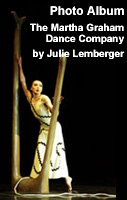




|
Home,
More Advice For Grown-Up Dancers ADVICE FOR GROWN-UP DANCERS "When are You Going to Quit Dancing and Get a Real Job?"
(We want to know what you think! Got a response to Anne's ideas? Or another issue you want to talk about? E-mail anne@danceinsider.com. If your letter is selected, you'll receive a free box of Luna Bars, the whole nutrition bar for women. Men like it too! Special thanks to Clif Bar.) Grown-up dancers, consider this festive holiday scene: 30-year-old female modern dancer living in New York City travels to her hometown to spend Thanksgiving with family. She's working and touring 20 weeks of the year with a mid-sized modern dance company, graduated from a prestigious conservatory of dance, is an adjunct instructor at her alma mater, and is currently producing her own choreography but still struggling with the high cost of New York City living. Dinner conversation drifts to the dancer's current disappointment in not getting showcased at a prominent theater for emerging choreographers. As the gravy boat gets passed over to Dad, he fires a shot from the bow. It is one of Dad's variations on a theme: "Mom and I are really worried about you, honey, when are you going to get a real job? You're really struggling with this dance thing and you're not getting any younger." This dancer, usually confident, has managed to achieve what many would consider a paradigm of success in the current dance climate. Yet at that moment a part of her shrinks, doubting herself and the choices she's made over the last 10 years. Most of us have learned from our environments to define ourselves by what we do. When asked who we are, we usually answer by stating our profession and/or our degrees, or feel we must state our affiliation with a dance organization or dance company. Thus our sense of ourselves may be almost entirely dependent on external validation. All of us have normal needs to feel like part of something larger and sustaining. If we do not feel like a part of the dance community or our connection is tenuous, we may feel ashamed, defensive or as if there is something seriously flawed in us. Worse, we may feel as if we're "on the outside looking in" and wait to be invited into the circle. We see power as residing outside of the self and it leaves us vulnerable and weakened. Thus, when people who don't fully understand our choices question those choices under the guise of "expressing concern," we may struggle with not feeling good enough. For women socialized to inhibit healthy expression of anger, we may turn the anger towards ourselves. As a result of feeling powerless over our environments, we may try to justify our lack of success or withdraw. We may just work harder and harder, feeling ourselves marginalized or not quite belonging. Some dancers become self-destructive through drugs, alcohol and sexually acting out. All our training experiences led us to believe that if we just worked hard enough and "want to dance enough" success would be ours. Significant others reinforce this model for success. For many people sustaining a life in dance there are residual feelings of chronic disappointment and dissatisfaction with the self that get triggered when we are invalidated -- for we tend to invalidate ourselves. For dancers just scraping by to satisfy basic needs, this is even more complicated. For the majority of dancers, not having earning power in a capitalist society translates into feeling bad about ourselves, even if we feel moderately successful as dancers and are validated by the dance community. Most of us have been taught to use our dance work and affiliations to define ourselves, know how we feel about ourselves, describe our successes, feel like we belong, and ultimately to justify our value in the world. What does this mean in a dance environment characterized by serious lack of opportunity, funding and resources? Not to mention that the dance environment exists within a larger culture which invalidates it. Because resources are compromised in this field, the model leaves thousands of creative and talented people feeling that they are somehow "less than." As Paul Ben-Itzak has commented in these pages, for instance, some young artists have come to see getting into the Joyce Theater's Altogether Different festival as a barometer of whether or not they've made it. Thus a theatrical producing organization which has limited resources itself becomes a measuring stick for large groups of artists. The model narrowly limits our experience of ourselves and results in a state of unrest for the majority of people dedicated to dance. As a former dancer and now in my psychotherapeutic practice, I have worked with dancers I consider casualties/survivors of this model. They decide to prematurely go into other fields or transition out of dance, and/or suffer a crisis of disillusionment and feel alone or confused, or devalue the choices they have made. Other dancers suffer serious crises around identity when they have been trained to view success through a narrow definition and are not presented with alternative models. How has our model for success in dance failed us? One good thing about recognizing this model as problematic is that the model can then take the blame for what we may have internalized as being our own failure, weakness or difficulty -- in psychodynamic terms, blaming ourselves for deficits in the environment helps us preserve an illusion of control over things that are truly uncontrollable. The illusion of control helps us preserve our world view as well as prevents us from seeing "the big picture." This model for success that we have received as absolute truth is powerful and pervasive, particularly in the dance world (hey, let's deconstruct that term -- stay tuned, grown-ups)! Very few of us can acknowledge that perhaps it is not the individual dancer or artist who fails but the model itself that is failing us. I have enormous respect for the artists and authors out there who are actively challenging these received models, and those people do exist. For instance, read "Dance, Power & Difference," edited by Sherry B. Shapiro in 1998 and published by Human Kinetics, Inc. There have been many casualties of this faulty model in the dance world. The dance field continues to observe itself predominantly through a Eurocentric, patriarchal and classist lens. Through more critical discourse these assumptions are changing. However, large numbers of dancers still define themselves by the outcome of their endeavors in dance without considering the larger context. While we all have healthy and normal strivings for achievement and recognition, what happens when the measures of success lie solely outside of the self? What is the cost to creative, contributing, grown-up dancers and those who love them? (Respond to Anne or propose a topic for discussion at anne@danceinsider.com. To read more about Anne, please visit the Contact Us page.) |
